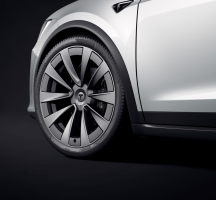
— A Tesla suspension failure lawsuit has been partly dismissed, including entirely for one of the two vehicle owners who filed the class action lawsuit.
The Tesla class action lawsuit was filed by plaintiffs Zachery Williams and Michael Ma regarding “Model S and Model X vehicles manufactured from September 17, 2013, to October 15, 2018."
Those Tesla vehicles allegedly suffer front and rear suspension control arm assembly defects which cause "components of the suspension system to prematurely loosen, wear, crack, or break."
“This defect manifests in one or more of the front upper and lower control arms, front suspension aft-link, front suspension fore-link, rear suspension upper link assembly, and rear suspension lower control arm assembly.” — Tesla suspension failure lawsuit
The claims from plaintiff Williams were put on hold so the court could issues its order on Tesla's motion to dismiss plaintiff Ma's claims.
The Tesla suspension lawsuit says Ma purchased a new 2014 Tesla Model S online and took delivery of the car on September 9, 2014. The Model S came with a 4-year/80,000-mile warranty, but in October 2019 the car made a rattling noise from the front-end when driving on rough roads at speeds of 25 mph or more.”
In November 2019, the plaintiff took the Model S to Tesla when the car had "58,057 miles on the odometer.”
To fix the rattling noise, Tesla replaced the failed lower aft links with a new front suspension aft link assembly, which cost the plaintiff “$1,320.12 out-of-pocket for the cost of parts and labor.”
Additionally, Tesla replaced the front lower fore links and strut bolts, but the automaker covered the cost of parts and labor under a technical service bulletin.
The class action lawsuit alleges Tesla has gone to great lengths to conceal its knowledge of alleged suspension defects and downplays how serious the problem is.
Judge Dismisses Tesla Suspension Failure Lawsuit
Tesla filed a motion to dismiss the class action claims made by plaintiff Ma and the judge agreed with Tesla's arguments. However, the judge ruled the plaintiff may refile a few of the dismissed claims.
The judge dismissed a breach of express warranty claim after Tesla argued the warranty doesn't cover repairs made after the warranty time or mileage periods have expired.
The plaintiff brought his Model S to Tesla for repairs on November 6, 2019, with “58,057 miles on the odometer.” This means the repairs occurred nearly a year and over 8,000 miles after his warranty expired.
But the plaintiff says the terms of the warranty are meaningless because the "warranty’s durational limitation is unconscionable."
According to the plaintiff, he had no choice but to accept the warranty terms because Tesla created those terms "which unreasonably favored Tesla” and that a “gross disparity in bargaining power existed . . . because Tesla knew or should have known that the Class Vehicles were defective at the time of sale and would fail well before their useful lives.”
The judge looked at California law and found that even if Tesla knew about an alleged suspension defect, the plaintiff provided no "facts showing the warranty was substantively unconscionable."
"Nothing in the complaint suggests the warranty terms are overly harsh or so one-sided as to shock the conscience, and the Court views it as somewhat unlikely that a routine time-and-miles limit in a car warranty would rise to that level." — Judge Haywood S. Gilliam, Jr.
Although Judge Gilliam dismissed the express warranty claim, he said the plaintiff could amend his claim.
Judge Gilliam also dismissed an implied warranty claim because the claim was time-barred by the statute of limitations. However, on this claim the plaintiff cannot refile his charge.
The plaintiff also filed a Magnuson-Moss Warranty Act claim, but the claim hinges on the express and implied warranty claims. Those claims were dismissed which necessarily means the Warranty Act claim is dismissed.
However, the judge says the dismissal is with leave to amend, but only with respect to the express warranty.
In addition, the judge dismissed fraud-based claims, but with leave to amend.
The Tesla suspension failure lawsuit was filed in the U.S. District Court for the Northern District of California, Oakland Division: Williams, et al., v. Tesla, Inc., et al.
The plaintiff is represented by McCune Wright Arevalo LLP.




